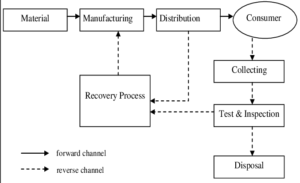Introduction:
The circular economy is rapidly gaining popularity in the logistics industry, with more and more companies realizing the benefits of sustainability and resource efficiency. With the shift towards circular business models, logistics companies have a significant role to play in enabling the circular economy by facilitating the movement of goods, materials, and resources within closed-loop systems. In this article, we explore how logistics companies are adapting to the rise of the circular economy and the strategies and innovations they are employing to drive sustainable logistics practices.
- Embracing Closed-Loop Supply Chains: Logistics companies are adopting closed-loop supply chains to enable the circular economy. By implementing reverse logistics systems, companies can recover materials, components, and products at the end of their lifecycle and reintroduce them back into the supply chain. This helps to reduce waste and conserve resources while creating new business opportunities.

Source: Google Images - Investing in Renewable Energy: The logistics industry is one of the largest contributors to greenhouse gas emissions. Logistics companies are now investing in renewable energy sources such as wind, solar, and geothermal energy to reduce their carbon footprint. This move towards renewable energy also helps to reduce energy costs and increase operational efficiency.
- Collaboration and Partnership: Collaboration and partnership are crucial for enabling the circular economy in the logistics industry. Logistics companies are working together with suppliers, customers, and other stakeholders to create closed-loop systems and drive sustainable logistics practices. This collaborative approach helps to maximize resource efficiency, reduce waste, and create new business opportunities.
- Technological Innovations: Logistics companies are also leveraging technology to drive sustainability in the industry. Technologies such as the Internet of Things (IoT), blockchain, and artificial intelligence (AI) are being used to create transparent and traceable supply chains, optimism logistics operations, and reduce waste. These technologies help logistics companies to monitor and manage their supply chains more effectively, making it easier to implement closed-loop systems and drive sustainability.

Source: Google Images - Shifting to Sustainable Transport: Logistics companies are also shifting to more sustainable modes of transport such as electric vehicles (EVs), hydrogen fuel cells, and biofuels. This move towards sustainable transport helps to reduce emissions and improve air quality while also reducing costs and increasing efficiency.
- Implementing Green Warehousing: Logistics companies are also implementing green warehousing practices to reduce their environmental impact. This includes using energy-efficient lighting and heating, implementing rainwater harvesting systems, and using renewable energy sources such as solar panels. Green warehousing practices also help to reduce waste and promote sustainability.
- Encouraging Sustainable Packaging: Sustainable packaging is becoming increasingly important in the logistics industry, and logistics companies are encouraging their customers to use eco-friendly packaging solutions. This includes using recyclable and biodegradable materials, reducing packaging size and weight, and implementing packaging reuse systems. By promoting sustainable packaging, logistics companies can reduce their environmental impact and drive sustainability throughout the supply chain.

Source: Google Images - Embracing the Circular Business Model: The circular business model is becoming increasingly popular in the logistics industry, with companies looking for ways to create value from waste and promote sustainability. Logistics companies are embracing the circular business model by implementing closed-loop supply chains, collaborating with stakeholders, and leveraging technology to create circular systems. By embracing the circular business model, logistics companies can drive sustainability and create new business opportunities.
- Focusing on Sustainable Sourcing: Logistics companies are also focusing on sustainable sourcing to promote sustainability and reduce their environmental impact. This includes sourcing materials and products from sustainable sources, implementing ethical and social standards, and reducing the use of harmful chemicals and substances. Sustainable sourcing helps to reduce the environmental impact of logistics operations and promotes sustainability throughout the supply chain.
- Promoting Sustainability through Corporate Social Responsibility: Corporate social responsibility (CSR) is becoming increasingly important in the logistics industry, and logistics companies are using CSR initiatives to promote sustainability and reduce their environmental impact. This includes implementing environmental management systems, promoting sustainable practices to employees and stakeholders, and supporting environmental charities and initiatives. By promoting sustainability through CSR, logistics companies can improve their reputation and contribute to a more sustainable future.
- Building a Circular Supply Chain: Logistics companies are also building circular supply chains to facilitate the circular economy. A circular supply chain is a closed-loop system where materials and products are continuously reused, repurposed, and recycled. Logistics companies are collaborating with suppliers, customers, and other stakeholders to create circular supply chains that maximize resource efficiency and reduce waste. By building circular supply chains, logistics companies can promote sustainability, reduce their environmental impact, and create new business opportunities.

Source: Google Images - Developing Sustainable Logistics Standards: Sustainable logistics standards are becoming increasingly important in the logistics industry, and logistics companies are developing and implementing standards to promote sustainability. These standards include environmental and social standards, ethical standards, and safety standards. By developing sustainable logistics standards, logistics companies can promote sustainable practices throughout the supply chain and demonstrate their commitment to sustainability.
- Using Data Analytics to Drive Sustainability: Data analytics is becoming increasingly important in the logistics industry, and logistics companies are using data to drive sustainability. Data analytics can be used to monitor and manage logistics operations, optimize supply chains, and reduce waste. By using data analytics, logistics companies can identify areas for improvement, make data-driven decisions, and promote sustainability.
- Promoting Sustainable Behaviour among Employees: Logistics companies are also promoting sustainable Behaviour among their employees to drive sustainability. This includes training employees on sustainable practices, promoting eco-friendly Behaviour, and incentivizing sustainable Behaviour. By promoting sustainable Behaviour among employees, logistics companies can create a culture of sustainability and drive sustainable practices throughout the organization.
- Adopting a Lifecycle Perspective: Logistics companies are adopting a lifecycle perspective to drive sustainability. A lifecycle perspective considers the environmental impact of logistics operations throughout the entire lifecycle of a product, from production to disposal. Logistics companies are working with suppliers, customers, and other stakeholders to reduce the environmental impact of logistics operations throughout the product lifecycle. By adopting a lifecycle perspective, logistics companies can promote sustainability and reduce their environmental impact.
- Implementing Green Transport Solutions: Logistics companies are also implementing green transport solutions to reduce their environmental impact. This includes using electric or hybrid vehicles, using alternative fuels such as biofuels, and implementing eco-driving techniques to reduce fuel consumption. Green transport solutions help to reduce emissions and promote sustainability.

Source: Google Images - Encouraging Sustainable Behaviour among Customers: Logistics companies are also encouraging sustainable behaviour among their customers to promote sustainability. This includes providing information on sustainable practices, incentivizing sustainable behaviour, and offering eco-friendly options. By encouraging sustainable behaviour among customers, logistics companies can promote sustainability throughout the supply chain.
- Collaborating with Partners: Logistics companies are collaborating with partners to promote sustainability and drive the circular economy. This includes working with suppliers, customers, and other stakeholders to implement sustainable practices and create circular systems. By collaborating with partners, logistics companies can promote sustainability, reduce their environmental impact, and create new business opportunities.
Conclusion:
The rise of the circular economy is transforming the logistics industry, and logistics companies are adapting to this new paradigm by implementing innovative strategies and embracing sustainable practices. By adopting closed-loop supply chains, investing in renewable energy, collaborating with stakeholders, leveraging technology, shifting to sustainable transport, implementing green warehousing, encouraging sustainable packaging, embracing the circular business model, focusing on sustainable sourcing, and promoting sustainability through CSR, logistics companies can drive sustainability and create a more sustainable future. As the circular economy gains momentum, logistics companies that embrace sustainable practices will be well positioned to succeed in a changing business landscape.


